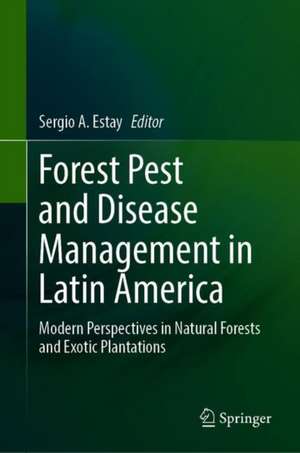Forest Pest and Disease Management in Latin America: Modern Perspectives in Natural Forests and Exotic Plantations
Editat de Sergio A. Estayen Limba Engleză Hardback – 26 feb 2020
| Toate formatele și edițiile | Preț | Express |
|---|---|---|
| Paperback (1) | 942.63 lei 6-8 săpt. | |
| Springer International Publishing – 26 feb 2021 | 942.63 lei 6-8 săpt. | |
| Hardback (1) | 948.61 lei 6-8 săpt. | |
| Springer International Publishing – 26 feb 2020 | 948.61 lei 6-8 săpt. |
Preț: 948.61 lei
Preț vechi: 1156.84 lei
-18% Nou
Puncte Express: 1423
Preț estimativ în valută:
181.52€ • 189.91$ • 150.79£
181.52€ • 189.91$ • 150.79£
Carte tipărită la comandă
Livrare economică 02-16 aprilie
Preluare comenzi: 021 569.72.76
Specificații
ISBN-13: 9783030351427
ISBN-10: 3030351424
Ilustrații: XIII, 239 p. 32 illus., 19 illus. in color.
Dimensiuni: 155 x 235 mm
Greutate: 0.54 kg
Ediția:1st ed. 2020
Editura: Springer International Publishing
Colecția Springer
Locul publicării:Cham, Switzerland
ISBN-10: 3030351424
Ilustrații: XIII, 239 p. 32 illus., 19 illus. in color.
Dimensiuni: 155 x 235 mm
Greutate: 0.54 kg
Ediția:1st ed. 2020
Editura: Springer International Publishing
Colecția Springer
Locul publicării:Cham, Switzerland
Cuprins
Chapter 1. Introduction.- Part 1. General perspectives.- Chapter 2. Biological control of forest pests in Uruguay.- Chapter 3. Past and Current Strategies for the Control of Leaf– cutting Ants in Brazil.- Chapter 4. Remote sensing for insect outbreak detection and assessment in Latin America.- Part 2. Pests of natural forests.- Chapter 5. Ormiscodes amphimone outbreaks frequency increased since 2000 in asubantarctic Nothofagus pumilio forests of Chilean Patagonia.- Chapter 6. Ormiscodes outbreaks dynamics: impacts and perspectives in a warming world.- Chapter 7. Native forest health in Chile: towards a strategy of sustainable management.- Part 3. Pests and diseases of forest plantations.- Chapter 8. Invasive insects in forest plantations of Argentina: ecological patterns and implications for management.- Chapter 9. Diseases of Eucalyptus plantations in Uruguay:current state and management alternatives.- Chapter 10. Pests Management in Colombian Forest Plantations.- Chapter 11. Diseases management in the forest plantations in Chile.- Chapter 12. Insect Pests Affecting Exotic Trees in Chile and Their Management.- Chapter 13. Pest status and management in the forest plantations of Costa Rica.- Chapter 14. Forest diseases in Brazil: status and management.- Index.
Notă biografică
Sergio A. Estay is a Forest Engineer from the University of Chile with a Master’s and PhD in Ecology from the Pontificia Universidad Católica de Chile. He has extensive experience in the management of projects and work teams in the area of entomology and applied ecology in public and private institutions. He is currently an Associate Professor at the Institute of Environmental and Evolutionary Sciences at the Universidad Austral de Chile and Associate Researcher at the Center of Applied Ecology and Sustainability at the Pontificia Universidad Católica de Chile (CAPES). He worked for several years in the control of quarantine forest pests for the Agriculture and Livestock Service, Ministry of Agriculture of Chile. His field of specialization is the ecology of populations with applications to the study of spatio-temporal patterns in the distribution and abundance of organisms and invasive species. He has published over 30 papers in journals as well as various other publications, book chapters, thematic guides and at congresses. In addition, he has been involved in numerous research projects in the area of plant health.
Textul de pe ultima copertă
By providing multiple economic goods and ecosystem services, Latin American forests play a key role in the environmental, social and economic welfare of the region’s countries. From the tropical forests of Central America to the Mediterranean and temperate vegetation of the southern cone, these forests face a myriad of phytosanitary problems that negatively impact on both conservation efforts and forest industry. This book brings together the perspectives of several Latin American researchers on pest and disease management. Each chapter provides modern views of the status and management alternatives to problems as serious as the impact of introduced exotic insects and diseases on Pinus and Eucalyptus plantations throughout the continent, and the emergence of novel insect outbreaks in tropical and temperate native forests associated with global warming. It is a valuable guide for researchers and practitioners working on forest health in Latin America and around the world.
Caracteristici
A unique book collecting the past and future trends in forest pest management in Latin America
Describes Latin American experiences in forest pest management, which are inadequately addressed in other books
Includes a rich study case on natural forests and exotic tree plantations in each chapter
Describes Latin American experiences in forest pest management, which are inadequately addressed in other books
Includes a rich study case on natural forests and exotic tree plantations in each chapter
